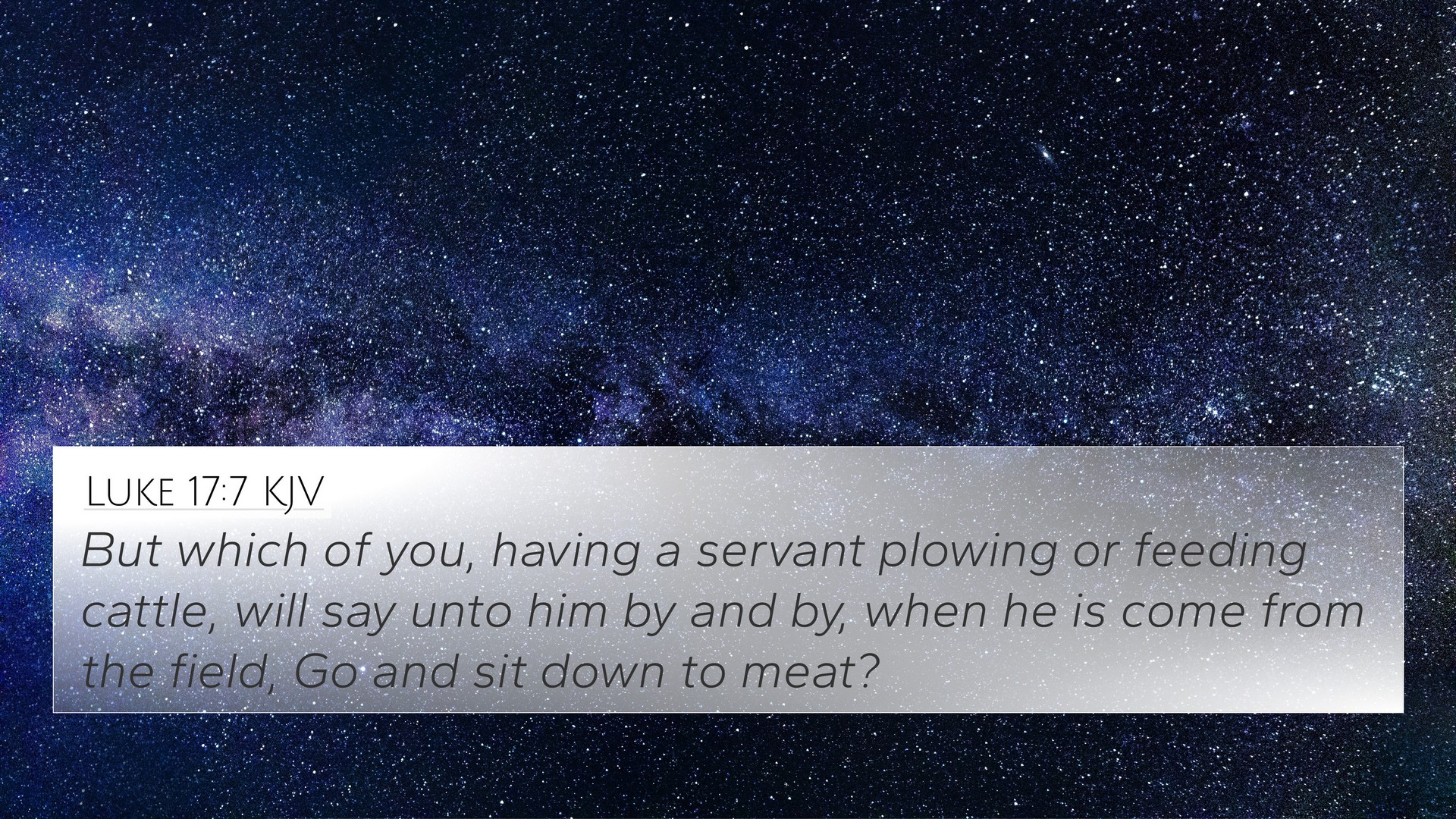Understanding Luke 17:7
Luke 17:7 states: "But who among you, having a servant plowing or tending sheep, will say to him when he has come in from the field, 'Come at once and sit down to eat'?" This verse is a powerful illustration of the expectations of servitude and the nature of duty.
Context and Meaning
This passage is spoken by Jesus, addressing His disciples about the nature of service and humility. It emphasizes that those who serve do so out of duty rather than anticipation of reward. Understanding this verse requires considering the following themes:
- Servitude: Jesus uses a hypothetical situation where a master would not immediately invite the servant to dinner after a day of work, illustrating the expectations of roles defined by duty.
- Humility: There is an underlying message of humility where the disciples are reminded that serving others is a foundational aspect of discipleship.
- Obedience: This verse exhorts believers to fulfill their obligations without seeking acknowledgment or praise, reflecting the nature of Christian obedience.
Commentary Insights
Commentators like Matthew Henry, Albert Barnes, and Adam Clarke provide insight into this verse, elaborating on its implications:
- Matthew Henry: He notes that the essence of the teaching focuses on the obligation of the servants to obey their masters, emphasizing that true servitude involves the attitude of heart and mind in the work performed.
- Albert Barnes: Barnes contextualizes this verse within the broader message of humility in the Christian life, explaining that the faithful are expected to serve without looking for commendation from those they serve.
- Adam Clarke: Clarke highlights the cultural norms of the time, explaining how this social structure illustrated Jesus’s point regarding the incongruity of expecting reward for fulfilling one’s responsibilities.
Bible Cross-References
This verse connects with several other scripture passages, illustrating the thematic links between servanthood and humility:
- Matthew 20:26-28: "Whoever wants to become great among you must be your servant..." This reflects the same principle of serving without seeking personal gain.
- John 13:12-15: Jesus washes the feet of His disciples, modeling servanthood as a key principle in the Kingdom of God.
- Philippians 2:5-7: Paul encourages believers to have the mindset of Christ, who took the nature of a servant.
- Galatians 5:13: "Serve one another humbly in love," connecting love and service as essential to the Christian walk.
- 1 Peter 5:5: "Clothe yourselves, all of you, with humility toward one another," emphasizing the relational aspect of service.
- Luke 12:37: Jesus promises blessings to those servants who are found ready and vigilant.
- Colossians 3:23-24: "Whatever you do, work heartily, as for the Lord..." representing the spirit in which one should serve.
Thematic Connections
Connections between these verses highlight various aspects of serving, including:
- Links between Servanthood and Leadership: Jesus redefines greatness through a servant leadership model.
- Attitude of Gratitude: The focus on duty over compensation invites believers to reflect on the motivations behind their actions.
- Inter-Biblical Dialogue: By studying these passages together, one can derive a comprehensive understanding of the role of service in a believer’s life.
Applications for Today
For modern readers, Luke 17:7 encourages a re-evaluation of personal motives in service:
- Service without Expectation: Believers are called to serve others in their communities and churches with no strings attached.
- Cultivating Humility: Embracing a humble mindset in all interactions not only honors God but also fosters deeper relationships with others.
- Living Out Faith: This verse invites followers of Christ to put their faith into action through sacrificial service.
Conclusion
In summary, Luke 17:7 serves as a profound teaching on the nature of servanthood, challenging believers to fulfill their duties humbly and without expectation of reward. By cross-referencing with other biblical passages, one can gain a fuller understanding of this essential concept within Christianity. The call to servanthood is consistently woven throughout the scriptures, encouraging all believers to integrate these principles into their lives.





